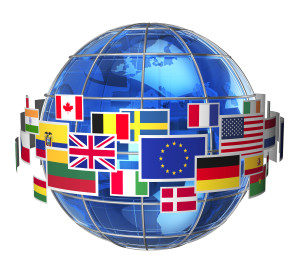What is an International Trade Policy Advisor?
 The Information Age has made it possible for a number of companies to enter new markets overseas, but those that decide to do so likely use the services of an international trade policy advisor. There are many benefits to doing business in a foreign country; for example, companies that sell items domestically may experience market saturation for their particular products, but introducing their products to new customers in different markets allow them to grow. However, there are challenges and many issues to consider when doing business internationally. If it were easy, then every company would be doing business in this manner. Here are some of the duties of international trade policy advisors, some steps to becoming one and a snapshot of the employment prospects for the job.
The Information Age has made it possible for a number of companies to enter new markets overseas, but those that decide to do so likely use the services of an international trade policy advisor. There are many benefits to doing business in a foreign country; for example, companies that sell items domestically may experience market saturation for their particular products, but introducing their products to new customers in different markets allow them to grow. However, there are challenges and many issues to consider when doing business internationally. If it were easy, then every company would be doing business in this manner. Here are some of the duties of international trade policy advisors, some steps to becoming one and a snapshot of the employment prospects for the job.
Job Duties of International Trade Advisors
International trade specialists communicate a foreign country’s business regulations to clients, and their information is tailored to the client’s product or service offerings. They can help clients to decide which geographic areas to target by providing them with demographic statistics and information about incentives for promoting trade in particular areas. For example, a country may want to preserve the natural habitat of an area, but they still need to consider the region’s economic prospects for practical purposes. These governments may decide to promote the tourism industry instead of heavy industrial manufacturing to gain revenues, and they might waive tariffs for businesses that will help them to achieve their tourism revenue goals for that region. Besides knowing how to locate statistical data and regulatory information quickly, these international policy advisors cultivate valuable relationships in foreign markets with international trade lawyers, accounting professionals and supply chain logistics experts. Based on the information that they gather from all their sources and contacts, international trade advisors can give sound recommendations about all foreign trade matters, and they usually prepare the necessary documentation that clients need to move forward in a foreign market. Some governments request that seasoned international trade policy advisors serve on committees that provide input to government foreign trade policy development, according to the International Trade Administration.
Career Path for International Trade Advisors
The traditional career path for international trade advisors almost always includes an undergraduate degree in business administration, economics, finance, political science, international business or international affairs. Some international trade specialists also have advanced degrees in these areas. Prospective international trade advisors take every opportunity to gain valuable, real world experience through study abroad programs and internships. Some of the most common internships can be found within a country’s department of foreign affairs and trade or commerce department; students can also learn much from internships with private import and export companies. Many international trade advisors seek out networking and continuing education opportunities by joining professional organizations like the Washington International Trade Association. Some even pursue certifications in international trade from private associations and universities. Learning the language of the people in the host market highlights the international trade advisor’s commitment to the career field and their likely many years of experience working as policy trade advisors.
Compensation and Job Growth for International Trade Agents
The career field of international trade is most closely associated with the job category of management consultant, and these consultants earned median annual salaries of $78,600 in 2012 according to the Bureau of Labor Statistics. The career prospects for international trade specialists are expected to grow through 2022 at a rate that is faster than average for all jobs surveyed.
Related Resource: Marketing Manager
Conclusion
As trade among countries increases so does the competition for international trade positions. A successful international trade policy advisor is knowledgeable about the business regulations of the country in which their clients want to operate, has academic exposure to international business concepts and great interpersonal skills.


